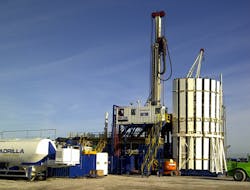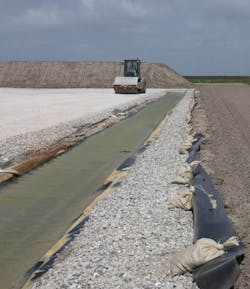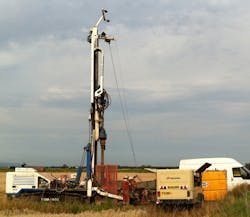Despite the promise of cheap domestic energy, shale gas has been slow to take off in the UK. In June fracking firm Cuadrilla Resources had a planning application for four wells in Lancashire declined. Campaigners hailed the decision as their "Waterloo". This article looks at the implications for the wastewater treatment industry.
By Ben Messenger
Hydraulic fracturing, also known as "fracking" is the process of forcing oil and gas from layers of shale buried deep below the ground through the injection of water. To many it is the just the olive branch we need to see us through the transition to more renewable forms of energy. To others it is little more than environmental vandalism with the potential to cause earthquakes and pollute groundwater.
In the US the industry has boomed with production rising from 2,116 billion cubic feet in 2008 to 11,415 billion 2013. That rise has ushered in an era of ultralow energy prices.
While the availability of cheap shale gas is challenging for the renewable energy sector, it provides a wide range of opportunities for companies in resource efficiency sectors, particularly in the water sector, according to a report by Impax Asset Management. The report cites the examples of US utility Aqua America which is building a pipeline to supply the Marcellus shale, and water and chemicals firm Ecolab which has seen strong revenue growth.
Waterloo
In the UK the backdrop is a little different. In 2011 the blame for a small earthquake near Blackpool fell at fracking's door. While that stopped the industry in its tracks, hopes that an extensive roll-out of the technology could eventually supply up to 10% of the country's gas requirements remained high. In January 2014 Prime Minister David Cameron declared that the then coalition government was "going all out for shale".
Furthermore, during her first Energy and Climate Change Committee meeting on 21 July, Secretary of State for Energy and Climate Change, Amber Rudd, reinforced the government's commitment.
"I think shale gas will be an important part of the energy mix for the UK and I also note that it's an important part of our decarbonisation targets because it is effectively a low carbon source (of energy)," she asserts. "Given that gas is going to remain an important part of our security of supply going forward, how much better to have our own gas than having to import it. So I remain committed to making sure we can explore for shale."
Waterloo
However, four years after the Blackpool incident, and following fierce debate from both sides, at the end of June this year Lancashire County Council refused Cuadrilla Resources's application to drill up to four wells near Little Plumpton. Environmental campaigners described it as "Waterloo".
It goes without saying that Staffordshire based Cuadrilla is not happy about the decision, and says that it plans to appeal. Others involved in the industry also remain bullish.
"This is just one adverse planning decision, where the professional judgment of planning officials, leading counsel and expert agencies was to approve based on the fact that all of the environmental, safety, health and local issues had been addressed," comments Ken Cronin, chief executive of industry umbrella body UK Onshore Oil and Gas. "Other exploration companies have already stated they will be putting in their own applications very shortly."
Lee Petts, managing director of Remsol, a Lancashire based environmental services firm which is involved in treating and disposing of flowback wastewater on behalf of Cuadrilla adds: "It's another delay, and that causes more anxiety for residents and more uncertainty for businesses."
Wastewater opportunities
According to Petts, there has been a huge amount of interest in shale gas ‘flowback' treatment in recent years, with many believing that a successful shale gas industry could stimulate significant growth in wastewater treatment markets.
"There probably isn't going to be much of an investment opportunity in the short-term exploratory phase," he tells WWi. "When we see a scaling-up to field development, there is likely to be a greater investment opportunity in mobile, site-based treatment for reuse."
That's a sentiment shared by Laura Grant, policy adviser at the Chartered Institution of Water and Environmental Management (CIWEM).
"The wastewater is going to be highly saline and contain low levels of naturally occurring radioactive material," she explains to WWi. "It would need specialist treatment or for the treatment plant to have the right permits in place which incurs a cost so they (the utilities) would be unlikely to invest until there is certainty in the supply chain.
"I would have thought that there will be very little impact on the water utilities from the decision to decline Cuadrilla's application as they are not currently geared up to accept wastewater from shale gas activities. Although this is something that some of them are looking into I don't think they are viewing it as a lucrative growth area just yet, at least until the industry gets off the ground," continues Grant.
Petts adds that in order to fully understand the situation it's necessary to separate exploration from future field development.
"For the exploration phase, Remsol has researched, identified, tested and proven a safe and effective method of treating and disposing of flowback wastewater on behalf of Cuadrilla Resources," he says. "Right now, there are around a dozen merchant waste treatment facilities that operate the identified treatment method in the UK, three of which also have the necessary permissions to do so."
According to Petts the method of treatment has been almost universally accepted as the best way to deal with the wastewater.
Collectively, the 12 or so sites have more than sufficient spare capacity to deal with the predicted volumes of flowback wastewater that might be seen in the next two to three years as Cuadrilla and other operators advance their plans.
Looking ahead
Looking ahead to field development, Petts sees it as unlikely that operators will continue to rely upon third party treatment and disposal capacity at remote locations for several reasons.
"Firstly cost," he says "For shale gas to be economically viable, well costs will need to be kept to a minimum, and so operators will want to avoid the expense of transporting wastewater by road in tankers and then paying to dispose of it. Secondly, local impacts: operators are already under intense pressure to try and minimise disruption to local residents, and traffic impacts are one of the worst culprits."
Because of this Petts thinks there will likely be much greater emphasis placed on the deployment of on-site clean-up technologies that will allow operators to reuse some of the flowback in subsequent fracture treatments.
This he says will create multiple benefits, including reduced demand for clean water, reduced traffic impacts and, of course, lower overall operating costs.
"We'll need to see a substantial growth in off-site treatment capacity," he argues. "Or if it's technically feasible, on-site treatment for discharge to the local environment, presenting potentially significant investment opportunities several years from now.
"But it doesn't end there," he continues. "And that's because once the wells are put into production, they will continue to co-produce flowback, along with the extracted gas, for the entire life of each well.
"At that stage, there will be no obvious opportunity for clean-up and reuse, and so it will require off-site disposal or the ability to treat on-site to a very high standard that means the residue can safely be discharged to a local watercourse."
Peering across the pond
Michael Coffey, managing director of consulting firm Aquastrat, argues that to get a picture of how wastewater treatment could be dealt with if fracking scales up we need to look to the US.
"In the US there are two or three companies like GE and Veolia that offer bespoke services for onsite water treatment," he tells WWi. "But as the oil price has fallen and the oil companies have sought to reduce costs, they've tried to outsource the water treatment side of all their hydrocarbon extraction activities."
Coffey continues: "The problem the water industry's got is that if an oil company is looking to outsource its water treatment, does it go to a water company? Or does it go to a company that can provide water treatment as part of a general package of logistical support like a Halliburton? I think that's where they're going to have to compete. It's not going to be an opportunity for utilities -- it's going to be for services companies."
That view is reinforced by Wayne Evans, vice president of industrial technology at Veolia's Water Technologies division, which supplies equipment services for fracking operations in North America.
"By and large the whole of fracking logistics is controlled by the service companies and it's very noticeable that they've been buying their own water treatment companies over the past few years to support them," he tells WWi.
"Generally they're resistant to the complexities of having a water company come in and help them. There's a presumption that an oilfield service company will take care of everything, certainly in the case of flowback water."
Conclusion
While Evans believes they would be relatively limited, if fracking were to grow in the UK he does see potential opportunities for water companies - if they can deliver the value that service companies provide.
"We very much take the view that as an environmental company there is a place to lend our expertise to help mitigate the environmental impact of fracking in the event that it goes ahead," he adds. "I think those opportunities are limited, but they may be more than in the US where most of the flowback water is deep well injected."
For the UK water industry it would seem that fracking is of interest, but is unlikely to produce any kind of gold rush. And for even those limited opportunities to be realised will require the fracking companies to ramp up the number of wells considerably.
Ben Messenger is a freelance contributor for WWi magazine. He can be reached at [email protected].
More Water & WasteWater International Archives Issue Articles





